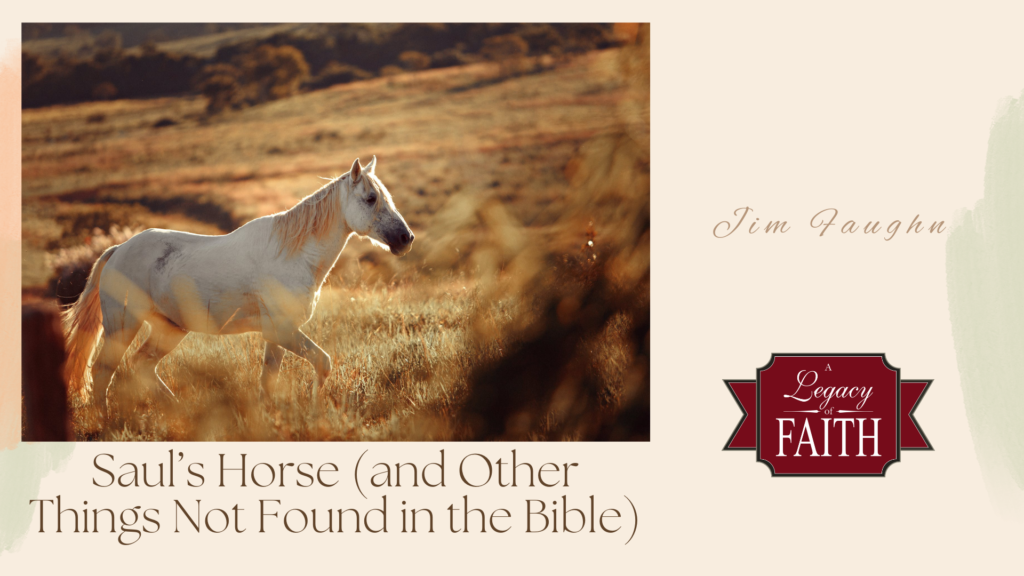Saul’s Horse (And Other Things Not in the Bible)
Those who are somewhat familiar with the Bible have heard sermons and lessons about the encounter that a man who then was known as Saul had with Jesus. The events are recorded in the ninth chapter of Acts.
As you may remember, Saul (later known as Paul) was on his way to Damascus when a very bright light appeared. Some preachers (I suppose in an attempt to add some drama to the Biblical account) have informed their listeners that the light was so bright that it knocked Saul off of his horse and onto the ground. While the text says that Saul did indeed fall to the ground, there is no mention of a horse (Acts 9:3-4).
All of that has caused me to think of other things that many people think or assume are in the Bible, but which are found nowhere in it. Some of those things may be of minor consequence. Others may have eternal consequences.
Some of the things I’m thinking about are:
- Adam and Eve eating an apple – The Bible nowhere informs the reader about what the “forbidden fruit” was.
- The number of the wise men who visited Mary, Joseph, and Jesus – Apparently, the assumption is that, since there were three gifts, there were three men. According to something I’ve read, at one time the accepted number of wise men was twelve. The truth is that the Bible tells us the number of gifts, but not the number of men.
- There is a great probability that what is known by many as “the nativity scene” never happened. The Bible does not say that the shepherds and wise men were visiting Mary, Joseph, and Jesus at the same time – or even in the same place. Instead, the record indicates that some time elapsed between the visit of the shepherds and that of the wise men. There are also indications that, by the time the wise men arrive, the family was in a house, not a stable. You may want to take a look at Matthew’s account where the word “house” is used and where we find these words about Herod’s reaction to being deceived by the wise men:“…he sent and killed all the male children in Bethlehem and in all that region who were two years old or under, according to the time that he had ascertained by the wise men” (Matt. 2:16). Does that not indicate that some time had elapsed since the birth of Jesus?
- “The sinner’s prayer” and/or “asking Jesus into your heart.” Instead of either or both of these which are found nowhere in the Bible, the answer given to those people on the Day of Pentecost who asked the apostles what to do once they had been convicted of their guilt, was, “Repent, and be baptized every one of you in the name of Jesus Christ for the forgiveness/remission of your sins, and you will receive the gift of the Holy Ghost” (Acts 2:38).
- As accepted, traditional, and often elaborate as they may be, there is nothing in the New Testament about honoring or remembering Jesus with special, seasonal religious observances. Instead, His instruction as recorded by the apostle Paul was “…do this in remembrance of Me” (1 Cor. 24, 25). Those who are familiar with The New Testament will remember that these instructions were not about celebrating the Lord’s birth or even His resurrection, but were, instead about “…the Lord’s supper… (v. 20) which was/is intended to “…proclaim the Lord’s death until He comes (v. 26). It may also be remembered by those familiar with this passage that it is found in a long discussion about what Christians were/are instructed to do “when you come together” – “when you come together as a church” – “on the first day of every week” (1 Cor. 11:17, 18; 16:2, ESV).
I will not take up more space or more of the time of those who have chosen to read this, but there are many other examples of things that people honestly think are in the Bible, but which are not. As suggested earlier, some may be of little consequence while others may determine where we will spend eternity.
Years ago, The Statler Brothers recorded a song entitled “The Regular Saturday Setback Card Game.” (Thanks to Adam Faughn for remembering the name of the song.) The “setting” of the song involves a bunch of “good old boys” sitting around, playing cards, and swapping stories. This line is about one of those men, “Uncle Clyde”:
“You can lead a horse to water” is in the Bible, he would say.
Well, like a lot of other things that people may think are there, that statement is not in God’s Word. Hopefully, “uncle Clyde” was better at playing cards than he was at quoting the Bible.
I guess that wouldn’t have really mattered, though. According to the song, the men spent so much time arguing and telling stories that they never got around to playing cards. On top of that, again according to the song, “uncle Clyde’s” Bible was still in the box when he died.
A humorous song about some fictitious men can serve as a serious reminder. We would all be well-advised to spend the time and make the effort to see what God actually does say in His Word. Much, much more than winning an argument or knowing the answer to a trivia question could be at stake!
It was the Lord who said…
The one who rejects me and does not receive my words has a judge;
the word that I have spoken will judge him on the last day (John 12:48).
AUTHOR: Jim Faughn
